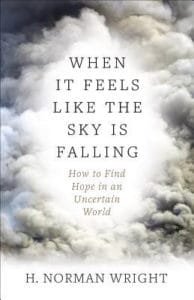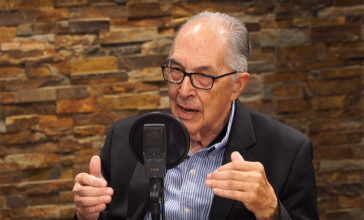Opening:
Excerpt:
Dr. Norm Wright: I’ve lost both of my children. My son died 29 years ago. (Jim: Yeah.) I still get hit a couple times a year, and I get ambushed. And I’ll be in a store, and something will trigger me off, and I’ll begin to cry. I never apologize for my tears because you never apologize for something that is a gift from God.
End of Excerpt
John Fuller: That’s Dr. Norm Wright describing how the unexpected events in our lives can have a really powerful effect on us. How will you respond in a crisis? Will you run from it? Will you deny that it’s even happening? Or are you gonna learn how to overcome it? We’ll explore that today on “Focus on the Family.” Your host is Focus president and author Jim Daly. And I’m John Fuller.
Jim Daly: John, I think it’s really human to, uh, not think about tragedy. It’s not where we want to go, yet it’s part of life. And it’s even uncomfortable to talk about stuff that’s rough and difficult in our lives. And we’ve got to be in a quiet place, we’ve got to be with trusted friends because it’s hard to open up and to talk about things that are really traumatic in this – in this life.
In reality, there are no exemptions. I mean, we’re gonna hit some difficulty somewhere. And you might be in a place where your life has been generally pretty good. Maybe you made it through school and got a good job, got married and things are moving along. Before long, you’re gonna hit something. Whatever it might be – the death of a loved one. It could be, uh, something like what happened 18 years ago, on 9/11, the unexpected attack that took 3,000 lives in New York. I mean, this is incredible when something like that happens. Um… the good news is there is a path for recovery, and that’s what we’re gonna talk about today with our great guest, who’s been doing traumatic recovery for years and years.
John: Dr. Norm Wright is a longtime friend who has been on this broadcast a number of times. It’s been quite a while since he’s been here, and we’re so glad he is, uh, rejoining us here. He’s been counseling married couples and families for more than 30 years. He’s a prolific author. He’s written, I believe, over 90 books. And today we’re gonna be really plumbing his extensive training as a traumatologist and a grief counselor.
Body:
Jim: Norm, welcome back to Focus on the Family.
Norm: Thank you. It’s always good to be here.
Jim: It’s been many years.
Norm: It has been.
Jim: But it is good. You have such a track record, um, in counseling, helping people. Uh, marriage, uh, is just one thing, and that’s a wonderful thing to fight for every day. That’s what we do here at “Focus on the Family.”
But also, that grief counseling, that trauma counseling. I’ve never really heard of the word traumatologist, and why don’t we start there…
Norm: OK.
Jim: …To explain to the listeners what is a day look like for a traumatologist?
Norm: Well, the word trauma has to do with wounding, and, um, traumatology is the study of, uh, wounds caused by either violence or accidents. And I’ve been involved in doing this, I just realized, almost 30, 35 years now. And you ask what is a day like? (Chuckling) I never know what it’s like when I begin because I do a lot of work over the phone, a lot of training over the phone. And, um, I’ll get people who call, and they apologize for calling, and I say, “Never apologize.”
Jim: Yeah.
Norm: “Because it took a lot of courage on your part to call somebody and talk about this. Tell me your story.” And that’s what I begin with because everybody has a story. The problem is, many times we tell this story to ourselves again and again and again. But it’s better if we can tell the story to some individual who can just listen. Uh, people ask me, “How do you know what to say, Norm?” And I tell them, “I don’t know what to say until I hear the story.”
Jim: Yeah.
Norm: And it might take two minutes. It might take 32 minutes. But once they’re able to unload, that’s the beginning of healing.
Jim: Yeah. And you know, in many ways, it’s so comforting to hear a person who has 35 years of experience doing this, that you don’t always know what to do. For those of us that might have a neighbor who comes to us, we may not know what to do either, what to say. You know, so often, Norman, I – I think this isn’t where I planned to start, but I’ll just trust that this is the Lord’s leading. So often, we can say the wrong things, uh, to an individual that’s gone through…
Norm: Oh.
Jim: …Some difficulty. Right from the start here, for us as believers in Christ, what are things to say and things to not say that are kind of 101 grief counseling?
Norm: One of the best things to do is to be honest and say, “I wish I knew what to say to help you, but I don’t.” And people appreciate your honesty. They appreciate you doing that. And the best thing is, listen and reflect.
Jim: Yeah.
Norm: Don’t try to fix. They don’t need to be fixed; they’re not broken.
Jim: Yeah.
Norm: They just need somebody that can walk with them. And, um, you – you made reference there to something that triggered it off. Uh, I remember one day I was listening to the radio, and I was listening to Jack Hayford, and he asked the question, “Who is the spiritual leader on your block?”
Jim: Huh.
Norm: And I thought, “Well, that’s a strange question. But OK, I’ll go with it.” And so I thought about the block where I lived, and I went up one side of Snowdon (ph), and I said, “There’s no spiritual leader there.” (LAUGHTER)
Jim: Right.
Norm: And so I came down the other side, and I came to this house, 2051 Snowdon. I know who lives there; that’s me. (LAUGHTER)
Jim: That’s good you could remember that! (LAUGHTER)
Norm: I know. But the question is really important – who is the spiritual leader on your block? – because, uh, that is the greatest time, the greatest opportunity to have people respond to the Gospel, is when you come alongside and say, “I heard that something happened, and I wondered if I could bring this over. And I’ve got a couple of little books here that maybe I could leave with you and maybe that would help you.” And so I ask people, “Who’s your spiritual leader on your block? But who’s the spiritual leader where you work and where you go to school?”
Jim: That is a great question, a great place to start. Now, you’ve titled this book When It Feels Like The Sky Is Falling: How To Find Hope In An Uncertain World. And you opened with a story about a terrorist attack in 1985, uh, something you got involved with. What happened?
Norm: Well, it’s hard to imagine that one of the first terrorist attacks happened about a hundred yards from the front door of my counseling center.
Jim: And that – was that in Southern California?
Norm: That was in Southern California in Santa Ana. And the director and founder of the Arab-American Anti-Discrimination League, uh, had an office next door. And, uh, on this particular day, it was different, because usually, he brought his wife and his 10-year-old daughter with him. They did not come with him that day. So he went into the office, and there was a package there. He opened it up, and it blew up. It killed him. It injured many others. It, uh, shattered windows and everything. And when I heard about this, it didn’t register where it was. And that night when the newscast came on, I’m looking at the newscast, and I’m looking at this building where the bomb went off, but I’m looking beyond it at the front door of my counseling center.
Jim: And you weren’t there that day?
Norm: No.
Jim: Oh, my goodness.
Norm: I wasn’t there. Uh, an office worker was there, and she called and said, they asked us to leave because of an explosion. And we still didn’t know what blew up. And then we found out what it was. And, um, it changed the life of so many individuals. And since then, I’ve been to one event after another. And when I go in there, I know I’m going to hear the unthinkable.
Jim: Yes.
Norm: I’m going to hear people’s lives just shattered. And my calling there is basically to be there. And to listen. And then to help normalize, because we live in a culture that does not teach about loss or grief until it happens to us. One of the worst times that it could ever try to deal with it is when it’s just happening. But if – if churches, if, uh, schools could spend some time teaching people about loss, about grief, and they realize that what I’m going through – it’s normal. I am not odd.
Jim: Yeah.
Norm: I am not, um, going crazy.
Jim: Yeah. And it’s one of the reasons we wanted to do this program – is to provide a tool to – to someone who is struggling, or if you know somebody who is struggling, this is the kind of program to put in their hands and the resource of Norm’s book.
Jim: Norm, let me ask you, though, with all the – you know, thousands of hours of help and counseling that you’ve provided, what are the reactions of people who go through trauma? You know, I’ve been through a couple of things.
Norm: Uh-hm.
Jim: Uh, an airplane, a small aircraft that crashed when I was 14 right outside my window across the street. And I called 911. I ran over to the plane. I was able to help get two 20-something young men out. I thought they were the only two in the plane, but there were two men that were decapitated, actually, in the front – their dads. One was a neurosurgeon from Fallbrook, California. And I remember just kicking into gear and trying to help. And there was another older man that came, and I was taking the young men to the curb across the street to get them away from the – the accident. And the plane exploded and burned this other man. And I mean – and the point I’m making there is not – I was just at the – that place at that time, and I knew…
Norm: You were functional, though.
Jim: I was reacting.
Norm: You were – you were able to do something. Many individuals are paralyzed by their fear. They can’t move. They don’t know what to say. They don’t know what to do.
Jim: And what is going on there with that person? Or both people – what – why does one person react one way and other people react different ways?
Norm: There are so many different factors that enter in. But what happens is that our brain has been shattered, because when there’s a trauma, it affects the brain, and you don’t think clearly. You don’t, uh, function well. Um, you don’t know what to do, and you need somebody to come alongside of you and listen to you and work with you and help you get the resources that you need at this particular time. There is hope. There is recovery, but we don’t believe it at that point.
I work with a group on Wednesday nights of, uh, parents who have lost children. And they are numb. They are devastated, and we hear the same thing week after week, month after month and sometimes year after year.
Jim: Right.
Norm: And I am conducting that group because I’ve lost both of my children, and nobody understands unless you have been there…
Jim: Right.
Norm: …Unless you have walked through that. And so that’s why I’m there. And I hurt sometimes. Sometimes, I go out in tears. But that’s all right.
Jim: I can only imagine, especially experiencing that. In that context, and there are people listening that are going through something and – or they have gone through something. And one of the things I gleaned from reading your book, Norm, is, um, to have empathy for those people. I can be a – and even in the reaction I just gave you, in that example, I’m kind of the guy that says, “Pull yourself up by your bootstraps. Let’s go.” And I can lack patience with a person who’s struggling to find that equilibrium that you’re describing.
For us that want to act and want to put it behind us, compartmentalize it – let’s go. This is life. Thank the Lord and count on him, and don’t look at the world for your joy or circumstances. You – you see what personality I’m driving at.
Norm: Oh, I can tell. Yeah.
Jim: But how do I slow down and know that this person can’t react the same way, and I’ve got to be mindful of that so I don’t hurt them?
Norm: You take some deep breaths, and you learn to relax at that time. And if you could have one phrase that would make a difference, it’s to come alongside and say, “Tell me what happened. Tell me your story.” Everybody has a story, but they’ve got to tell it. And one of the things I use so much with individuals is hand-write out your experience.
Um, my first three trips back from 9/11, I got in the back of the airplane, and I sat there for three hours and wrote the story of what I had been through, what I had seen, what I had felt. And I just had to get it out, because if you don’t get it out, it gets a hold in your brain, and you’re not going to be functional at all.
Jim: And in that regard, um, some people may not find it easy to write, but verbalizing it – uh, you also encourage people to talk about your story.
Norm: Yes.
Jim: I would think it’s a similar effect.
Norm: It’s similar. It’s ideal when you hand-write it out, because that way, you’re getting the energy out as well. And so yes, write it out. Talk it out.
John: Yeah.
Norm: Find somebody who you think is safe. When I have somebody that comes in and they – they’re in grief, I say, “Who are the people in your life that you want to share this with?” And we identify them. And then I go one step further. “Who are the people you don’t want around at all?”
Jim: Right.
Norm: And we talk about how to distance yourself from those individuals.
Jim: And there are people hearing this, going, “I know that list.”
Norm: Oh.
Jim: “I know who I wouldn’t want.”
Norm: You’re on the list (laughter).
Jim: “…And who I would want.” Yeah. Exactly. My type would be on that list. Don’t get – get it around him.
John: Well, this is “Focus on the Family” with Jim Daly, and our guest is Dr. H. Norman Wright. And, uh, we’re talking about his book, When It Feels Like The Sky Is Falling: How To Find Hope In An Uncertain World. And we have copies of that, and this entire broadcast, at focusonthefamily.com/broadcast, or call 1-800, the letter A and the word FAMILY.
Jim: Norm, in your book, you mention an intriguing statement. You say we become superheroes with learning disabilities. Um, what did you mean by that?
Norm: Sometimes, I have to ask myself what I mean by that. (LAUGHTER)
John: It’s a catchy phrase (laughter).
Norm: Yeah. It is. I wonder what I meant by that.
John: Yeah.
Norm: No. What it is is that we can function in the midst of all of this to a certain level. And then we don’t know where to go with it. We don’t know what to say. We don’t know how to – to find the help that we are looking for.
Um, I’ve – I’ve worked with individuals who are, like yourself, you were a superhero at that time when you pulled people out of that airplane. But you probably didn’t remember a whole lot. You probably had to debrief yourself later on. And, um, when you experience a trauma of any kind, don’t be surprised that it comes back months later, years later.
Um, I’ve lost both of my children. My son died 29 years ago.
Jim: Yeah.
John: Hm.
Norm: I still get hit a couple times a year, and I get ambushed. And I’ll be in a store, and something will trigger me off, and I’ll begin to cry. I never apologize for my tears because you never apologize for something that is a gift from God.
Jim: Yeah.
Norm: And so I know I needed that. I needed to get that out. Uh, I wish it wasn’t in front of all these strangers, but that’s OK. They can handle it. And maybe they will be helped by it. Or maybe afterwards, somebody came up – will come up to me and say, “I saw what happened there. Uh, I’d like to know more about it.”
John: Yeah.
Norm: And, um, I carry with me this little book, Experiencing Grief, because, um, I’m always looking and listening, both verbally and nonverbally. And if I see somebody who’s having a difficult time, I might come over and hand them the little book and say, uh, “You know, maybe this will help. Why don’t you read it when you are ready?” See; I emphasize that – “When you are ready” – because one of the things that we do with people who are in grief is we try to shut them down.
Jim: Right.
Norm: We try to make sure that they’re not crying anymore. Why? Help them cry.
Jim: Yes.
Norm: Cry with them because they need that. And if they can read this and get something out of it, wonderful.
Jim: Norm, let me ask you this. You know, in a Christian context, is it OK to be angry at God, and for how long? And how does that discussion go? And I think, you know, all of us, especially if we’re committed believers in Christ – we encounter a terrible situation. We hold back in that honest discussion with God. Perhaps we refrain from being honest with him and how much it hurts. How do – how do we manage our relationship with God when bad things happen to us?
Norm: If I were working with you and you have not asked the question, “Why? Why, God? Where were you?” I will bring it up because I know it’s somewhere there, and you’re probably wondering, “Is it OK to voice that?”
Jim: So you’ll prompt it.
Norm: I will prompt it. Job asked the question 16 times. Did he ever get an answer? No. Uh, people think about Job, that he got everything restored to him – his family, his goods, everything. That’s not the theme of the Book of Job. The Book of Job was a new relationship with God, because he said earlier, “I had heard of you with my ears. Now I have seen you with my eyes.” And so it’s important to talk about, “Why, God?”, because it’s not just a question. It’s a cry of protest, and eventually, that cry of protest turns from “Why?” to “What can I learn through this?”
Jim: Yeah.
Norm: “How can I grow through this? And maybe, maybe, how can God be glorified through this?” One of the things that I tell people is that no tragedy is ever wasted in God’s economy.
Jim: Yes.
Norm: He will use it. The number of people that I have worked with over the years who’ve had disabled children, who have lost children to death, who have lost family members – I can draw on where I’ve been and share that with them. And maybe by my sharing, it encourages them to open up and say, “Well, now that you mention that, here’s what’s going on with me, Norm.”
Jim: Yeah.
Norm: We go from there.
Jim: The – uh. There’s so many things popping in my mind right now. Romans 8:28 – we can struggle with that. Uh, of course, that Scripture says that all things work for good to those who love the Lord and are called by his name.
Norm: James 1.
Jim: Yeah.
Norm: “Count it all joy, my brethren.” Count it means make up your mind to regard that adversity as something to welcome and to be glad about.
Jim: Now, I have to imagine, Norm, there are people listening who have gone through something devastating. They’re still trying to reconcile Romans 8:28.
Norm: Oh.
Jim: They’re still trying to figure out, “Lord, why? How can this lead to some kind of good? The taking of my spouse” – whatever it might be. If you’re in that spot for a long period of time, what advice do you have to begin to let – as you said earlier, let this seep out of you? Writing it down, vocalizing it – what if you’ve done those things and it’s still – there’s this gnawing irritation about God doing this to you?
Norm: You continue to ask those questions. You continue to talk to other people.
Jim: So continue to wrestle.
Norm: You keep on wrestling. Uh, find a grief group. Uh, GriefShare is in over 17,000, uh, churches in this country, and, uh, the number of people they have just ministered to is just amazing. And this is a part of the group that I work with. And I – I work with regular groups, but at the same time, I also work with the groups where they’ve lost a child, because you carry with you a shadow grief the rest of your life when you’ve lost a child.
Jim: Always present.
Norm: It’s always under the surface.
Jim: Right.
Norm: And the little things that can just trigger them off – the song, the sight…
Jim: Yeah.
Norm: I remember looking at a young man walking and, uh, it was like I was seeing my son Matthew again. Uh, we expected, uh, something with Matthew, because he was a profoundly retarded son. What we didn’t expect was the death of my daughter, Sheryl. And I’ll never – (emotion) I’ll never forget getting the phone call from Bill. “Norm, Sheryl died during the night.” It was totally unreal. I wasn’t hearing that.
Jim: And she was only in her 50s.
Norm: Fifty-three.
Jim: Yeah.
Norm: And, uh, I just had to hear it again and again. I read it again the other day, and it just put me under the table.
Jim: Yeah.
Norm: But that’s all right. I will grieve her probably the rest of my life.
Jim: My brother who lost a son – he said to me on the phone not long ago – he said, “Not a day goes by that I don’t think of him.” And that’s true, isn’t it?
Norm: It is.
Jim: And it’s hard for those of us who maybe have not had that happen to us, to understand that.
Norm: Well, other people say, “Well, you need to get on with your life.” No, that’s not what we need to hear. “I see your hurt. I see your pain.”
Jim: Yeah.
Norm: Just try to connect in that way.
Jim: Yeah.
Norm: Loss is a big part of our life.
Jim: Yeah.
Norm: Grief is a part of our life. The more you and I can understand about this, the better off we will be to handle it and realize this is life. This is normal.
Jim: Norm, an additional good thing I think you put in your book – and – and we’re coming down to the end, but I want to continue if we can and come back tomorrow and talk more about this. But I want to make sure we put a tool in the hands of the folks that are grieving and are hurting and they’re hearing this and it’s raising issues now for them. Certainly, we want you to call us. We have caring Christian counselors that are here to help you. But in addition to that, um, you mention, um, find something to do. And this resonates with me, because you can get stuck on the couch or your – your comfy chair and get lost in that loneliness. The idea of getting up and getting out and doing something – maybe it’s that group that you mentioned. But – but I want you to amplify that – why that is important for a human being who is grieving and in a very isolated place. Why is it so important to get up and do something?
Norm: If we can do something, we feel like we’re contributing. We feel like there’s something here that, um, maybe will help in the life of another person. Maybe it’s taking a little book and going out, uh, to a group at the church and – and sharing your story and passing out these books, um, because that way, I feel productive. Otherwise, I feel like I’m draining everybody else.
Jim: Right.
Norm: And, um, I want to feel like my life continues to count. That’s – that’s so important. Uh, this is why that – that statement – who is the spiritual leader on your block? Maybe five houses up, there’s been a loss. And so we call them and say, “I’d like to bring you a meal over. What would you like? And here’s four possibilities. And I have a little DVD called Tear Soup, and I can bring it with me, and it takes maybe 16 minutes to watch it. And we can sit there and we can watch.” And I know what’s going to happen, because I’ve done this myself. I’ll take the food over. I’ll take the DVD over. And then I’ll go home with an empty plate, because they’ll eat it all, but they will not send home that little DVD…
Jim: They’ll keep that.
Norm: …Because they’re going to say, “I want to watch it again. I’ve got relatives coming in this weekend. I want them to hear it.” And in 16 minutes, it normalizes for you what, um – what you’re, um, going through at this time. And so this is something tangible we can do.
Um, I – I encourage people to make a list and, um, have something to do every day. It might take you five minutes. It might take you five hours. But that way, you can look back and say, “You know? In spite of what I went through, I was productive.”
I’m working right now with a couple from Las Vegas. I’ve seen them over 60 times.
Jim: They were part of the shooting there?
Norm: They lost their daughter, and she was 22. And they described it in such a way that when I think about the loss of that girl, I began to cry, because it was so real.
Jim: Yeah.
Norm: But this couple, they don’t think they’re – they’ve improved. I see the improvement. And they’re sharing in this group, and they’re telling what they’re doing, and they’re telling how they’re helping other individuals. And that is giving them something to hang onto.
Jim: Mm-hm.
John: Yes.
Norm: We want to feel like, “I’m not wasting this experience.”
Closing:
Jim: Well, Norm, I so appreciate that, and that’s a good place to end on a very tough subject. And again, “Focus on the Family” is here for you. If you’re going through something that we have, you know, I think somewhat intentionally struck a nerve with you, um, call us. Get in touch with us. We have a great network of counselors around the country that we can refer you to. We can talk to you here with our counseling team initially and then refer you.
We have resources, like Norm’s book, uh, to put into your hands. We want to be there for you. Want to be that friend, that neighbor. I wish I was Norm’s neighbor (laughter) because that is just so comforting to have somebody who cares and who is willing to sit down with me during a very dark time in my life. And, uh, Norm, like I said, let’s come back again. Let’s pick up the conversation on your great book, When It Feels Like The Sky Is Falling. And, um, I hope that if you’re impacted that you will call us. We are here for you.
John: And our number is 800, the letter A and the word FAMILY. 800-232-6459. Online, you can find the book and other resources at focusonthefamily.com/broadcast.
You know, we’re listener-supported here at this ministry, which means we’re counting on you to help us produce broadcasts like this one, and to provide tools for families who need help like counseling, and other resources.
So please, let me invite you to make a monthly pledge to this family ministry. That’s going to help us to manage our various projects in the coming days, and to really reach out and equip people in need to grow spiritually and relationally. Your regular support is so critical.
And having said that, we recognize that some people aren’t in a position to. There’s some ups and downs you’re dealing with financially, and you can’t make that monthly commitment. It’s okay. A one-time gift of any amount will actually make a big difference, as well. Uh… if everyone listening right now could just make a one-time gift, it would make a huge difference in the impact Focus on the Family can make.
And so, please, donate today and we’ll say thank you by sending a copy of Dr. Wright’s book. And uh… you can learn more at focusonthefamily.com/broadcast.
Well, next time you’ll hear more from Dr. Wright about how trauma impacts us in some unexpected ways.
Teaser:
Norm: The majority of people who experience PTSD – they’re everyday individuals. You’re driving down the street, and all of a sudden, somebody runs out in front of you, and you hit them. OK, you’ve been traumatized.
End of Teaser



















